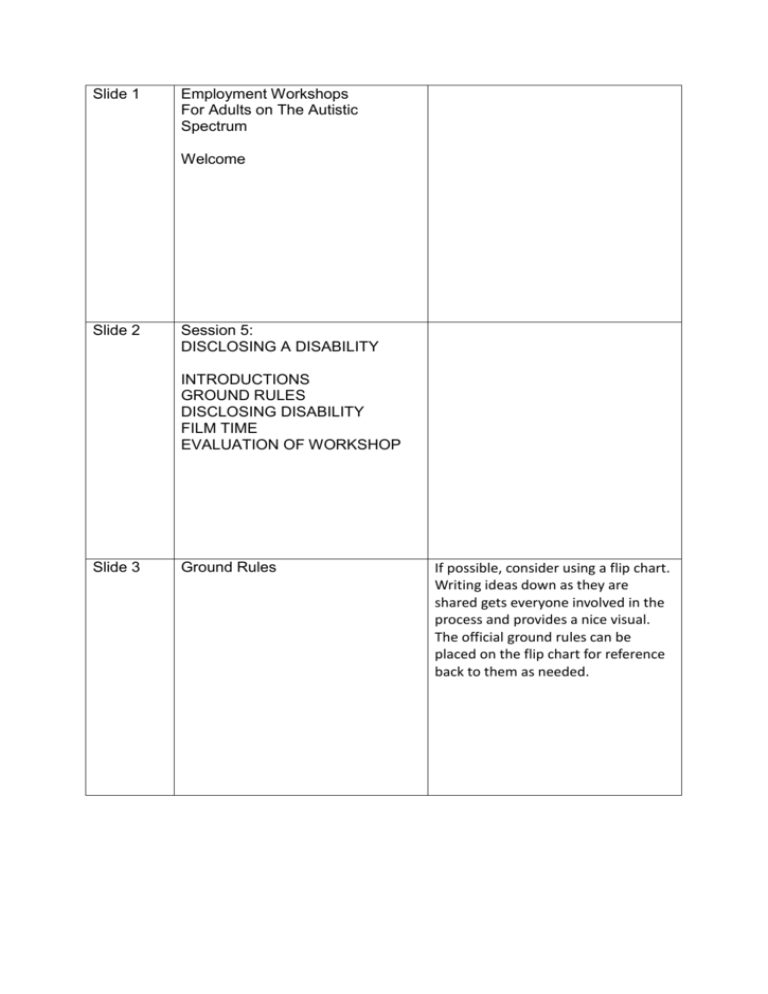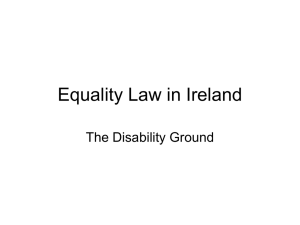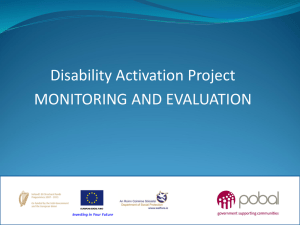Explanatory Notes - Powerpoint - Session5
advertisement

Slide 1 Employment Workshops For Adults on The Autistic Spectrum Welcome Slide 2 Session 5: DISCLOSING A DISABILITY INTRODUCTIONS GROUND RULES DISCLOSING DISABILITY FILM TIME EVALUATION OF WORKSHOP Slide 3 Ground Rules If possible, consider using a flip chart. Writing ideas down as they are shared gets everyone involved in the process and provides a nice visual. The official ground rules can be placed on the flip chart for reference back to them as needed. Slide 4 DISCLOSING A DISABILITYWHAT DOES THE LAW SAY? Doesn’t mean positive discrimination, just fair treatment and reasonable adjustments. If you have a disability you are protected by The Equality Act 2010. This act makes it unlawful for employers to treat an applicant or employee with disabilities less favourably than other applicants or employees for any reasons connected to their disability unless there is justification for such action. Slide 5 WHAT IS MEANT BY A DISABILITY? The Equality Act 2010 considers someone to be disabled if they have a physical or mental impairment that has a substantial and long-term adverse effect on their ability to carry out normal day-to-day activities. ‘substantial’ is more than minor or trivial ‘long-term’ means lasting 12 months or more Slide 6 DISCLOSING A DISABILITY, IT’S A PERSONAL THING Under the Equality Act 2010 you can choose whether or not to disclose your disability when applying for a job. BUT if the job you are applying for will put you in situations where your disability could present a risk to your own health and safety or to that of your colleagues then you MUST disclose it. Autism / Asperger Syndrome is recognised as substantial and long term. It does vary in the extent of the effect it has. Main web site http://www.legislation.gov.uk/ukpga/ 2010/15/contents For example someone who is deaf would be at danger working in a factory with moving fork lift trucks. The fork truck warns it is reversing by going beep beep. Slide 7 I DON’T WANT TO DISCLOSE MY DISABILITY ! You may not want the employer to know about your disability, as you feel they may reject your application immediately. You may feel that your disability does not actually affect your ability to do the job so why draw attention to it. You may feel that your application will not be considered on its merits. Slide 8 WHY CONSIDER DISCLOSING A DISABILITY ! You are protected by the Equality Act 2010 It is AGAINST THE LAW for employers to discriminate against disabled people in their recruitment and selection procedures. If you do disclose the law against discrimination can protect you, if you don’t it can’t. Slide 9 WHY CONSIDER DISCLOSING A DISABILITY ! ‘Reasonable Adjustments’ Under the Equality Act 2010, employers must consider making any 'reasonable adjustments' you might need to enable you to work for them. As long as you can do the job safely there is no obligation to disclose BUT this has some consequences. Slide 10 Slide 11 WHAT IS A REASONABLE ADJUSTMENT? EXAMPLE OF SOME REASONABLE ADJUSTMENTS FOR AUTISM As a group let’s come up with some possible adjustments that might help someone on the spectrum in work. Written instructions Clear written schedule Facing the wall Quiet office Clear instructions Fixed routine Small groups Noise cancelling headphones Regular short extra 5 minute breaks Accommodated schedules eg 10:00 to 6:00 No Christmas decorations at my work station WHAT IS A REASONABLE ADJUSTMENT? Have you had a difficulty in the past in a work place or volunteering position that a “reasonable adjustment” would have made easier. Slide 12 WHY CONSIDER DISCLOSING A DISABILITY ! If your employer does not know you have a disability, they cannot make adjustments to help you succeed in your job. An employment tribunal might decide that your employer was justified in failing to make adjustments for you. Could an employer know about your autism if you didn’t tell him? Slide 13 WHY CONSIDER DISCLOSING A DISABILITY ! Many employers are committed to employing disabled people and may actively seek to recruit people with disabilities to reflect their commitment to a diverse workforce. Look out for the Two Ticks symbol Check employers' equal opportunity policies as well. Slide 14 THINGS TO CONSIDER. Before making your decision, some things to think about : The nature of your disability and the work. The terms and conditions of the job. The nature and culture of the employer: have you looked at their website? Does it refer to ways in which they help people with disabilities? Slide 15 THINGS TO CONSIDER. Are there any health and safety issues that need to be addressed? The consequences of not disclosing your disability. Could your disability come to light in some way in the future? If that happened how would you deal with it? SOME EMPLOYERS ACTIVELY SEEK DISABLED STAFF. THEY “FEEL GOOD” ABOUT EMPLOYING PEOPLE WITH A DISABILITY. Slide 16 SO YOU’VE DECIDED TO DISCLOSE. DISCLOSE IN A POSITIVE WAY DON’T JUST TALK ABOUT THE NEGATIVES Slide 17 POSITIVES Excellent attention to detail Methodical – picking and packing roles Accuracy - cataloguing and filing Good long term memory Very knowledgeable in areas of interest Strong research skills (project work) Logical problem solving skills Visual thinkers Slide 18 SO WHEN WOULD BE GOOD? Application stage: There may be a section on the application form asking about any serious health conditions or disabilities. Although you don't have to disclose your disability here, you mustn't lie. If you don't want to disclose, simply don't answer the question. You can also use the personal statement section of the form to tell an employer about your disability. GENERALISATIONS BUT AS A GROUP THESE ARE COMMON ATTRIBUTES Slide 19 SO WHEN SHOULD BE GOOD? Application stage: Being open about the impairment would provide a very good answer to demonstrate a key competency required by the job; The nature of the job is such that it MAY be seen as an advantage to have impairment, e.g. applying for a role as a disability officer; Look for an opening to be positive. Slide 20 SO WHEN WOULD BE GOOD? Application stage: The employer is positive about the recruitment of disabled people and may for example be a ‘two ticks’ employer; You may feel that not disclosing leaves out a part of who you are. Does it actually give you a better chance. Slide 21 SO WHEN WOULD BE GOOD? CV: It accounts for the unusual make up of your CV e.g. longer than average spent acquiring certain qualifications. It may explain periods which show as gaps in your career history; It may show why your application may look ’thin’ in terms of experience or achievements . Use it to make your CV better not worse. Slide 22 SO WHEN WOULD BE GOOD? COVERING LETTER: If you mention your disability here, emphasise how it has further developed the skills and experience mentioned in your CV. However, only raise this when it's relevant to your application. For example, point to how well you've achieved your goals despite any difficulties. Employers value perseverance and drive. Slide 23 SO WHEN WOULD BE GOOD? PRE-INTERVIEW STAGE: This may be when you want to identify practical needs so you can compete equally with other applicants. If you haven't been asked about your needs, take the initiative and contact the employer in advance they may need time to make arrangements. Slide 24 SO WHEN WOULD BE GOOD? INTERVIEW: you may feel more comfortable disclosing when you can discuss the implications face-to-face and more clearly demonstrate your skills. If you've previously mentioned your disability, the interview can be an opportunity to expand on the positive effects it's had on your life and how it's enhanced your employability. Work out a script. Try not to be timid. Example practical adjusrtments Remember, equality act, ‘reasonable adjustments’ Need to refer to written notes need one question at time. Not looking you in the face Not making eye contact Not facing a bright window Voice might sound monotonous / monotonic Slide 25 SO WHEN WOULD BE GOOD? IN THE JOB: You may decide not to disclose your disability until you've been offered the job or started. You can decide who to tell - your manager or HR - and you can also request that colleagues aren't told. If your condition affects the way you work, it may be helpful to be open with colleagues so they understand and can help you with anything you may need.. Slide 26 WHAT SHOULD I SAY? Let’s write a short script and try it out.? What would I put in my CV or covering letter? Keep your disclosure statement short, simple and to the point. Do not go into a long explanation of the history of Asperger Syndrome, scientific theories about its cause, or all of the ways that someone can be affected. Instead, summarize the condition in 1 or 2 sentences, state your challenges, and list the specific accommodations that you believe will address them. I have a condition called Asperger Syndrome that makes it hard for me to remember oral instructions. I work well with written instructions to learn the proper procedure for tasks.” “One of the side effects of my autism is I’m very sensitive to office noise. If I wear headphones I can concentrate well.” “My Asperger syndrome means I am very good at paying attention to detail which makes me a good technician ” My Asperger syndrome means I don’t have great social skills. It also means I don’t get involved in office gossip. My Asperger syndrome means that I can be uncomfortable with changes in routine, it also means I am uncomfortable leaving work early or getting to work late. Although my Asperger syndrome can make me anxious I have learned strategies that mean I have overcome this and now work confidently in the work place. My Asperger syndrome means that I see the world differently. It also means that my creative output is distinctive and innovative. Slide 27 MAIN POINTS AGAIN BE POSITIVE: Only discuss your disability in terms of its relevance to your performance in the job. Don't go into personal detail. Always be positive about your disability and use it to provide evidence of the skills employers look for. Slide 28 MAIN POINTS AGAIN BE POSITIVE: Emphasise positive achievements and give examples. You may have gained skills such as flexibility, determination, the ability to perform under pressure and creative problemsolving as a result of your disability, Don’t be afraid to use these as selling points. Slide 29 MAIN POINTS AGAIN BE POSITIVE: Make a positive statement about your disability to remove any doubts an employer may have. Don't assume they’ll have a negative attitude - your experiences and skills may give you the edge over other candidates. Slide 30 IT’S ALL ABOUT THE JOB Slide 31 Don’t focus the whole of your application or interview on the issue of your disability. Focus on your suitability for the job. Most interviewers have little experience of autism and most know little of the implications. Be prepared to say what adjustments you would need in order to do the job effectively. Speak to an advisor you trust about whether, when and how to tell an employer about your disability. FILM TIME Talking about An Autism Spectrum Diagnosis at Work (7:03) Slide 32 EVALUATION How has this session gone for you ? Did you contribute ? Were you listened to ? Did you feel comfortable ? Have you found out anything new ? Is there anything we need to change for next time?





